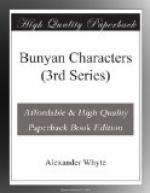And, accordingly, the clever rogues of that day soon
discovered that it was far easier for them to take
up a pair of shears and to clip a sliver of silver
off the rough rim of a shilling, or a shaving of gold
off a sovereign, than it was to take of their coats
and work a hard day’s work. Till to clip
the coin of the realm soon became one of the easiest
and most profitable kinds of crime. In the time
of Elizabeth a great improvement was made in the way
of coining the public money; but it was soon found
that this had only made matters worse. For now,
side by side with a pure and unimpaired and full-valued
currency, and mingled up everywhere with it, there
was the old, clipped, debased, and far too light gold
and silver money; till troubles arose in connection
with the coinage and circulation of the country that
can only be told by Macaulay’s extraordinarily
graphic pen. ’It may well be doubted,’
Macaulay says, in the twenty-first chapter of his History
of England, ’whether all the misery which
has been inflicted on the English nation in a quarter
of a century by bad Kings, bad Ministers, bad Parliaments,
and bad Judges was equal to the misery caused in a
single year by bad crowns and bad shillings.
Whether Whigs or Tories, Protestants or Papists were
uppermost, the grazier drove his beasts to market,
the grocer weighed out his currants, the draper measured
out his broadcloth, the hum of buyers and sellers
was as loud as ever in the towns; the cream overflowed
the pails of Cheshire; the apple juice foamed in the
presses of Herefordshire; the piles of crockery glowed
in the furnaces of the Trent, and the barrows of coal
rolled fast along the timber railways of the Tyne.
But when the great instrument of exchange became
thoroughly deranged all trade and all industry were
smitten as with a palsy. Nothing could be purchased
without a dispute. Over every counter there
was wrangling from morning to night. The employer
and his workmen had a quarrel as regularly as Saturday
night came round. On a fair day or a market
day the clamours, the disputes, the reproaches, the
taunts, the curses, were incessant. No merchant
would contract to deliver goods without making some
stipulation about the quality of the coin in which
he was to be paid. The price of the necessaries
of life, of shoes, of ale, of oatmeal, rose fast.
The bit of metal called a shilling the labourer found
would not go so far as sixpence. One day Tonson
sends forty brass shillings to Dryden, to say nothing
of clipped money. The great poet sends them
all back and demands in their place good guineas.
“I expect,” he says, “good silver,
not such as I had formerly.” Meanwhile,
at every session of the Old Bailey the most terrible
example of coiners and clippers was made. Hurdles,
with four, five, six wretches convicted of counterfeiting
or mutilating the money of the realm, were dragged
month after month up Holborn Hill.’ But
I cannot copy the whole chapter, wonderful as the




